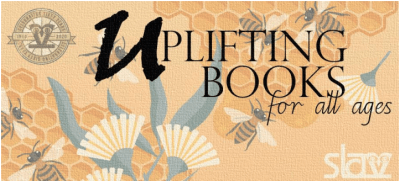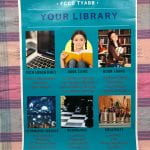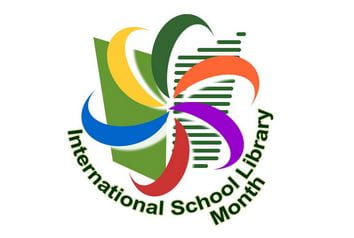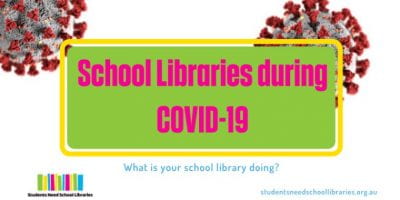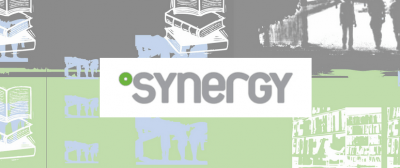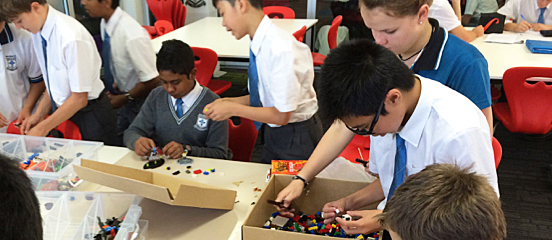 Our thanks to those who were able to join us for our SLAV online Book Club on Thursday October 12th, 2023, to discuss the topic: Promotional Tactics. We asked members to consider promotional ideas or tactics – the way they talk about a book to students, the display they create, the activity they have created for an English class or book club, the tantalising review they have shared. We asked members to come along prepared to share quick and easy tactics for promoting a particular title, author or a genre that your students just cannot resist!
Our thanks to those who were able to join us for our SLAV online Book Club on Thursday October 12th, 2023, to discuss the topic: Promotional Tactics. We asked members to consider promotional ideas or tactics – the way they talk about a book to students, the display they create, the activity they have created for an English class or book club, the tantalising review they have shared. We asked members to come along prepared to share quick and easy tactics for promoting a particular title, author or a genre that your students just cannot resist!
This was a HUGE success, and we have a fabulous resource of ideas from our chat space below and a padlet full of ideas and images as a result. All our members had so many wonderful contributions to share with us, it is greatly appreciated! Join us again on November 16th to discuss the topic – Short Books and Short Stories.
This was our seventh book club meeting for 2023, and we want to say a very special thank you to all who have attended and contributed to these informal and informative meetings. We cannot wait to see you at our next meeting, your generosity is greatly appreciated.
You can see our full list of planned topics for 2023 HERE.
We absolutely encourage you to reach out to the wonderful Jenny at The Younger Sun as an invaluable resource, for further information and recommendations. The staff at The Younger Sun are incredibly knowledgeable!
Disclaimer: The lists generated as a result of Book Club discussions are not, by any means, an exhaustive list of all titles or authors for each genre/category discussed. Nor will all titles be suitable for all libraries. We advise staff discretion when referencing these lists, to properly confirm individual title suitability for individual libraries, school and student’s needs. These are suggested titles only, shared by our members and inclusion on, or exclusion from, a list does not suggest SLAV endorsement or rejection of a title.
Ideas for Promotional tactics shared by Book Club Members
Padlet with Jenny’s list and other ideas too –
https://padlet.com/slavconnects/jenny-s-list-new-books-october-23-dvxcazitbl4w4q65
https://padlet.com/slavconnects/cornerstone-collection-slav-online-book-club-7m4pi39ziamyy07n
- Banned Book Week – I do banned book week. and do a survey to see who reads banned books.
- I follow @greatlibrarydisplays on Instagram. They recently showcased a library display that suggested titles according to a reader’s perception of their concentration span. I thought that validated those who only want to engage with quick reads, right beside those who love a tome.
- Mainly compiling Reading Lists in ePlatform collection to engage staff and students with ebooks and audiobooks. Range of themes, including the current and topical – First Nations; Harmony Week; ANZAC Day; International Women’s Day etc. – https://vsv.eplatform.co/
- What could be the story you’d like to write or read about? What’s your outline for a story or novel:
- Identity:Could it be that you seek Identity and wanting to find your place in the world in young adult literature? Readers as seeking to find themselves in stories. Readers want to relate to a story. Writers continue to create relatable stories. What are some of the stories or novels which relate to you? The following are a list of Lebanese Australian authors and some of the books they have written for young people: Bro by Helen Chebatte, The Cult of Romance, Hate is Such a Strong Word by Sarah Ayoub, The F Team by Rawa Arja, Half My Luck by Kamaleddine, Samera, Huda and Me by Hayek, H, The Last Migration by Jad El Hage, 10 Things I Hate About Me by Abdel-Fattah, Randa, Huda and Me by H. Hayek
- We have just had a display – You’ve seen the movie… now read the book!
- I have also done a couple of different shelf displays for genre (pictures shared on padlet)
- Our students love browsing non-fiction.
- Yes, our English class also agreed to come in once a fortnight, English team very supportive. We read aloud a few minutes to them as well. For our (English) reading classes, we have split the 29 students into 2 (or sometimes 3) groups, so they are with their English teacher for one activity, and with library tls/staff for the other time – rotate every 15 or 20 mins.
- It seems to cut down behavioural problems and enable more personal interaction, though it is very fast paced. I agree – the boys will read if they think it’s the right book for them. We have flexible learning spaces where the groups can be.
- I have also done a genre vote each other vote. I use forms, then select two most borrowed books in that genre here is a link. https://forms.gle/F3jftrcwwJhYrvtL9
- We also used short stories to read aloud to our boys’ secondary students, and the VATE (English site) has short story competition winners. Some picture books/poems work well.
- https://www.vate.org.au/story-miniature-2023-writing-competition
- https://docs.google.com/forms/d/e/1FAIpQLSdsqH2f94jPThlTtNT2ej1R8Wp8-pbLjiGjIRcF9FuMRQBQ7w/viewform?usp=sf_link
- We use Beanstack Yr 7 & 8 – we call it reading detectives
- I use forms for a lot of surveys and quizzes as well as paper based within the library
- I ran an “escape room” set of puzzles during book week.
- I work in an early childhood school, I use book taster circles to expose students to range of books.
- For creating a buzz about literacy and books, for secondary students and for staff – lots of ideas on https://janeaustenlf.org/ Founded by Caroline Jane Knight, Jane Austen’s fifth great-niece, the Jane Austen Literacy Foundation is a Melbourne-based, not-for-profit organisation – includes a great writing competition
- CBCA Shadow Judging, they can become published reviewers as well.
- I used the FYI / synergy book (building a reading culture) to write a proposal for the executive as to different ways that we can get our students reading. I used data to say our student weren’t reading and that we needed to dramatically change our student’s mindset about reading. I now have all Year 7 come to the library once a fortnight to try and encourage them to read. I always do something promotional at the beginning to get their interest – book trailers, reading the blurb. We do a book tasting (Teachers pay teachers have all the sheets to print) once a term. Have been buying books that will suit the students. Change displays regularly to promote books. Have a competition between English classes to see who can borrow the most books for pizza party.
- The Printz Award in America is also a possibility if you want to take them beyond Australian shores.
- We challenge our students with the Premiers Reading Challenge while they attend once a week Library Class and at the end of Year we have an Awards and invite local MP .
- Do a PowerPoint presentation during lunches. I did one where used emojis to help explain the mood of the book.
- Poem Forest by Red Room Poetry gets them reading student poem compositions and is a way of encouraging published writing from students.
- Author talks have helped.
- Peer reviews on school library website/catalogue to engage students with books. We run “Biscuits and Books”once a week.
- Shelftalkers if they would like peer reviews, and/ or become published reviewers themselves https://www.shelftalkers.slav.vic.edu.au/
- ‘Speed dating’ is great around Library Lovers’ Day. ‘Speed tasting’ when MasterChef kicks off. 2 minutes per book then circle the ‘matching emoji’ for their reaction/feel. e.g. smiley face with love heart eyes = My new favourite, and so on. Or, delicious, is there more in the pot? etc… Simple but effective.
- I start with a class challenge for PRC first student submitting the required form and adding online from their class receive a block of chocolate and everyone after that chocolates are always give out. Chocolate is the attraction.
- Bookmarks printed with a pic of the teacher at the top of the bookmark – we then ask them to put the bookmark in a book they have read / would like to recommend – the kids enjoy searching out the teachers faces and seeing what they like.
- We have a list of staff’s favourites on a web page. The bookmarks take it to the next level.
- For Primary schools – YABBA Virtual Author Events – https://www.yabba.org.au/
- SLAV Question Generator – https://slav.org.au/Question-Generator can be used to create question stems for book discussion in book clubs or classes.
- Author talks. We had Steven Herrick and Sophie Masson visit us this year.
- Flip cards – we have a set for a topic of interest – kids like them.
- We do an emoji treasure hunt for year 7s at the beginning of the year. This gives them a chance to look around library and get to know what is where.
- A couple of our library staff have a trolley of popular and easy read books ready for each reading session, so that students who are overwhelmed by too much choice, simply pick from the trolley. We also have a customized trolley of books for our Gifted class.
- Lucky dip titles – if you don’t know what to read take a slip with the title of book for student to look for and read.
- Photos of students holding their favourite book as a kid and the one they’re currently reading, to promote reading progression and embracing a reading culture across one’s lifetime.
- Laminated book suggestion cards
- During the Covid years we used our school portal as a place for students in years 7 and 8 to record their reading, their reflections on their reading some reviews of books they’d read and to read the reviews of others. This was a great way to give students voice and to encourage peer recommendations.
- Kids lit quiz – website link on padlet
What We Are Reading – Adult Titles.
Yellowface by RF Kuang
The Passage of Love by Alex Miller
A Man’s Place by Annie Ernaux
A Study in drowning by Ava Reid & The Thursday Murder Club #4
Stone Yard Devotional by Charlotte Wood
The Scholar by Dervla McTiernan – book 2 in the Cormac Reilly series
The Seven Husbands of Evelyn Hugo by Taylor Jenkins Reid
The Milkwood Permaculture Living Handbook: Habits for Hope in a Changing World
The Coast by Dr Eleanor Sweetapple story of a 10yr old placed in quarantine for leprosy in Sydney
I’ve just started Wifedom: Mrs Orwell’s Invisible Life by Anna Funder.
The Unbelieved by Vikki Petraitis – really incredible strong female protagonist, crime fiction.
Bandit Queens by Parini Shroff
A Gentleman in Moscow by Amor Towles
A People’s tragedy the Russian revolution by Orlando Figes
Kate Atkinson – Normal Rules don’t apply (Short stories)

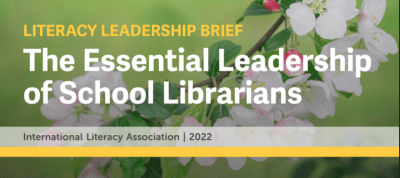 Important professional reading recently published. You can read the PDF using the link below.
Important professional reading recently published. You can read the PDF using the link below.